A guide for first year PhD students: Expectations, responsibilities, advice
The first year of a PhD can feel like a rollercoaster ride. First-year PhD students are ambitious and want to fulfil expectations. At the same time, they may be unsure of what these expectations and their responsibilities are. This guide aims to provide first-year PhD students with some directions and advice.
Disclaimer: This post may contain affiliate links, which means I may earn a small commission if you make a purchase using the links below at no additional cost to you. I only recommend products or services that I truly believe can benefit my audience. As always, my opinions are my own.

The first year as a PhD student: Excitement, ambition, overwhelm
What to expect as a first-year phd student, responsibilities of a first-year phd student, a supervisor’s expectations of a first-year phd student, thesis/dissertation, academic skills, relationships and networking, health and well-being.
Starting a PhD is exciting. Securing a PhD position is a major life event, and often something that first-year year PhD students have been working towards for a long time.
Many PhD students cannot wait to start. They already want to prepare in the weeks and months leading up to their new positions. And once they do start, they are full of energy, ambitions and plans.
First-year PhD students want to do well, make progress with their projects and meet their supervisors’ expectations. However, it is not always clear what that means.
“Am I doing enough? Do I make enough progress? Am I smart enough? Did I bite off more than I can chew?”
Questions like these, and insecurities, often develop early on in a PhD journey.
Furthermore, starting in a new environment can also be draining. There are new colleagues, new processes, and many unwritten rules in academia. Coupled with open questions about the direction of one’s PhD research, the first year can feel overwhelming.
To avoid overwhelm, it helps to know that the first year of a PhD involves much more than just figuring out one’s research. And absolutely normal to feel lost from time to time.
Succeeding in academia has many facets, including your thesis or dissertation, but also learning new skills, and developing relationships with supervisors, colleagues and scholars in your field. All of that takes energy.
Set realistic expectations for yourself in the first year of your PhD. Not everything will work out as planned. Research takes time, and setbacks are inevitable.
Doing a PhD is often experienced as very stressful : many PhD students are perfectionists, and a PhD requires a lot of self-responsibility. Consequently, PhD work tends to feel very personal, and criticism can sting.
First-year PhD students can deal with ‘failures’ more constructively by realizing that failures are an inevitable part of academic work, and by adopting a more welcoming attitude to criticism and feedback.
First-year PhD students can also expect to read and explore a lot. At times, this involves going down the rabbit hole of academic literature: processing new information, frameworks and perspectives before discarding them again.
Thinking, researching, experimenting, writing and editing are not straightforward processes, and a lot of learning takes place along the way.
Specific requirements and responsibilities of a first-year PhD student differ from programme to programme.
However, frequently a key responsibility of a PhD student is to develop a firm research proposal in the first year, which is often coupled with an extensive literature review.
This requires first-year PhD students to immerse themselves in the relevant literature. However, it is also recommended to read a bit outside of your field or discipline to gain new perspectives.
If a PhD programme involves course work, as is for instance the case in North America much more than in Europe, then planning and starting coursework is also often a responsibility during the first year.
All in all, a first-year PhD student is responsible to get organised and create a feasible plan for the coming years. The first year is meant to set the foundation for the PhD trajectory .
Unless the PhD programme is followed online, and unless there is a pandemic raging, first-year PhD students are additionally often expected to actively participate in the research group, lab or department in which they are based.
Active participation can range from simply showing up regularly, to attending lunches with colleagues, attending research events or presenting preliminary findings.

The internet is full of horror stories of PhD supervisors having extremely unrealistic expectations of first-year PhD students. For instance, several publications in the first year.
While this can certainly happen, I dare to say that this is not the norm.
Again, specific expectations or requirements in terms of performance and output of first-year PhD students can differ from university to university, and from supervisor to supervisor.
Beyond that, however, there are several expectations that many PhD supervisors have of first-year PhD students.
For instance, PhD supervisors tend to appreciate some levels of regularity and consistency. While it is absolutely normal to have periods where you make more progress (for instance in writing) than in others, it is not good to contact your supervisor every day for a month, and then fall off the earth for half a year.
Consistency goes hand in hand with good communication. Communication, respect and openness are fundamental elements in a good supervisor-supervisee relationship.
Many supervisors prefer first-year PhD students to ask for help and support if they experience roadblocks of any kind, instead of finding out that after a year no progress was made.
Lastly, supervisors often expect PhD students to take matters into their own hands. Instead of simply waiting for instruction, this means that first-year PhD students should be in the driver’s seat of their journey. Therefore, it is no surprise that proactiveness is one of the 10 qualities of successful PhD students.
25 things every first year PhD student should do
To turn the more abstract discussion on expectations and responsibilities into more concrete advice, the following list includes 25 things (divided into five categories) that every first-year PhD student should do.
- Read as much as you can. Write down your thoughts and observations.
- Develop a system to keep track of the literature you are reading (for instance through an excel file, notebooks, or a reference manager like Zotero ).
- Develop a literature review on your research topic.
- Familiarise yourself with your university’s PhD requirements (such as length, number of publications, required coursework, etc.).
- Read a few PhD theses from your field and university to understand what is ultimately expected from you.
- Get into the habit of writing . It does not have to be purely academic text. Write down your observations, write blog posts, and write a research diary. The more you write, the easier it gets.
- Develop a good system of communication and effective supervision meetings with your PhD supervisor/s.
- Get into the habit of talking about your research. Speak to your friends about your work, and discuss some readings with your colleagues. Try to formulate your thoughts in an accessible way. The more you do this, the easier it gets.
- Present something in a friendly environment (such as your research group) to practice public speaking .
- Learn how to prioritise tasks . Sometimes, prioritising one task means ruthlessly dropping others. Get comfortable with it. No one can do it all.
- Get to know your supervisor/s . Learn about their research and activities, their preferences and things like their preferred way of communicating. Don’t just expect your supervisor/s to adjust to your preferences, also adjust to theirs.
- Be present in your department, lab or research group. Chat with colleagues, exchange information, support each other and socialise. Collaboration is always better than competition.
- Develop a good support network outside of work. Even the nicest PhD trajectory can be stressful and frustrating from time to time. Know who has your back and can provide support and/or distraction when needed.
- Get to know the administrators and secretaries of your university. They hold a lot of power and you want them on your side!
- Start your online presence by filling out your university profile page, and setting up a professional Twitter account or a LinkedIn profile. You want people to be able to find information about you and your research online.
- Observe your energy levels and find your rhythm. Some people concentrate better in the morning, others late at night. Figure out when to tackle difficult tasks, when to schedule meetings, and when to take breaks. A PhD is not a regular 9 to 5 job. If you have flexibility in your time planning, optimise your routine so that it fits you .
- Be kind to yourself. When having negative thoughts, speak them out loud. Would you talk to your friends or colleagues the same way you talk to yourself? Probably not. Be forgiving and compassionate if you have a bad day.
- Foster an identity outside of your PhD by taking time for instance for hobbies, family and friends. It will help you to separate your self-worth from your PhD work.
- Prioritise your health and well-being . This involves for example getting proper sleep , exercising and eating healthily. Not only will you feel better, but your work will also benefit.
- Take proper breaks. Getting burnout is not a badge of honour or testimony to your dedication. Work smarter, not harder.
Master Academia
Get new content delivered directly to your inbox.
Subscribe and receive Master Academia's quarterly newsletter.
Deciding between a one- or a two-year master's degree
Email signatures for phd students (content, tips and examples), related articles.

The best answers to “What are your plans after graduation?”

Planning your PhD research: A 3-year PhD timeline example

Writing a successful academic CV (and a free template)
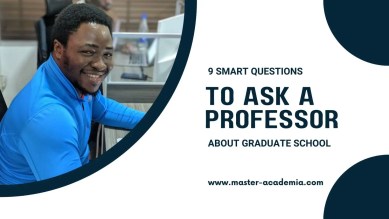
9 smart questions to ask a professor about graduate school
Thank you for visiting nature.com. You are using a browser version with limited support for CSS. To obtain the best experience, we recommend you use a more up to date browser (or turn off compatibility mode in Internet Explorer). In the meantime, to ensure continued support, we are displaying the site without styles and JavaScript.
- View all journals
- Explore content
- About the journal
- Publish with us
- Sign up for alerts
- CAREER COLUMN
- 06 November 2018
Twenty things I wish I’d known when I started my PhD
- Lucy A. Taylor 0
Lucy A. Taylor earned her zoology PhD from the University of Oxford, UK. She is now a postdoctoral researcher at Save the Elephants in Nairobi, Kenya, and a visiting researcher in the Department of Zoology at Oxford.
You can also search for this author in PubMed Google Scholar
Starting a PhD can be tough. Looking back, there are many things I wish I’d known at the beginning. Here, I have curated a list of advice from current PhD students and postdoctoral researchers from the Department of Zoology at my institution, the University of Oxford, UK, to aid new graduate students.
Access options
Access Nature and 54 other Nature Portfolio journals
Get Nature+, our best-value online-access subscription
24,99 € / 30 days
cancel any time
Subscribe to this journal
Receive 51 print issues and online access
185,98 € per year
only 3,65 € per issue
Rent or buy this article
Prices vary by article type
Prices may be subject to local taxes which are calculated during checkout
doi: https://doi.org/10.1038/d41586-018-07332-x
This is an article from the Nature Careers Community, a place for Nature readers to share their professional experiences and advice. Guest posts are encouraged. You can get in touch with the editor at [email protected].
Related Articles

What makes a good PhD student?
Make the most of PhDs

From industry to stay-at-home father to non-profit leadership
Career Q&A 24 OCT 24

How I’m learning to navigate academia as someone with ADHD
Career Column 24 OCT 24

How to run a successful internship programme
Career Feature 23 OCT 24

How job-seeking scientists should walk the line between high-calibre and humble
Career Feature 21 OCT 24

Restore Internet access in war-torn Sudan
Editorial 15 OCT 24

How I apply Indigenous wisdom to Western science and nurture Native American students
Career Q&A 25 SEP 24
Assistant Professor of Molecular Genetics and Microbiology
The Department of Molecular Genetics and Microbiology at the University of New Mexico School of Medicine (http://mgm.unm.edu/index.html) is seeking...
University of New Mexico, Albuquerque

Assistant/Associate/Professor of Pediatrics (Neonatology)
Join the Department of Pediatrics at the University of Illinois College of Medicine Peoria as a full-time Neonatologist.
Peoria, Illinois
University of Illinois College of Medicine Peoria
Professor / Assistant Professor (Tenure Track) of Quantum Correlated Condensed and Synthetic Matter
The Department of Physics (www.phys.ethz.ch) at ETH Zurich invites applications for the above-mentioned position.
Zurich city
Associate or Senior Editor, Nature Communications (Structural Biology, Biochemistry, or Biophysics)
Job Title: Associate or Senior Editor, Nature Communications (Structural Biology, Biochemistry, or Biophysics) Locations: New York, Philadelphia, S...
New York City, New York (US)
Springer Nature Ltd
Faculty (Open Rank) - Bioengineering and Immunoengineering
The Pritzker School of Molecular Engineering (PME) at the University of Chicago invites applications for multiple faculty positions (open rank) in ...
Chicago, Illinois
University of Chicago, Pritzker School of Molecular Engineering
Sign up for the Nature Briefing newsletter — what matters in science, free to your inbox daily.
Quick links
- Explore articles by subject
- Guide to authors
- Editorial policies

What should be a daily routine for PhD Students? Our proven checklist
PhD is the topmost academic honor , we write this line every time in our articles, only to make you understand how serious it is. To achieve the doctoral award, one has to develop some routine habits and self-discipline throughout the tenure.
This article is not the kind of all other articles on the internet which demonstrate some common things. Here is the standard daily routine process we advise our students to follow. This work, and will work for you.
Stay tuned with this content, it will certainly change your PhD journey.
The 7+8= 6 formula
Your daily planner, parkinson’s law , balance reading, writing and research , prepare goals for a day, check the goals for the day .
- Learn a single new thing every day
Do exercise
Check your computational work, and make a backup, an ideal daily routine for a phd student, wrapping up: , a daily routine for phd students: .
This one is our proven formula, trust me. Sleep for 7 hours, work for 8 hours, for all 6 days in a week. Rest is very important to reduce the burden and tension. Make sure you rest for at least 7 hours every day no matter how much workload you have.
Work for 8 hours, including your research, lectures and other academic activities. Do check your daily work amount, without failure. No matter what you do (related to your PhD), you have to work for 8 hours every single day.
This routine should be followed for six-day, and you can take a rest, party, read or walk around on Sunday. Follow the 7+8=6 formula and let me know your experience.
As a PhD student, you must have your daily planner on your PC or laptop or on your desk. The daily planner will show you your work picture for the entire month. If you don’t have one, download it from here.
Make a red circle when you fail to achieve a goal or daily progress. This will make you a better researcher. Plan, roughly your work for the month and try to achieve every single objective every day.
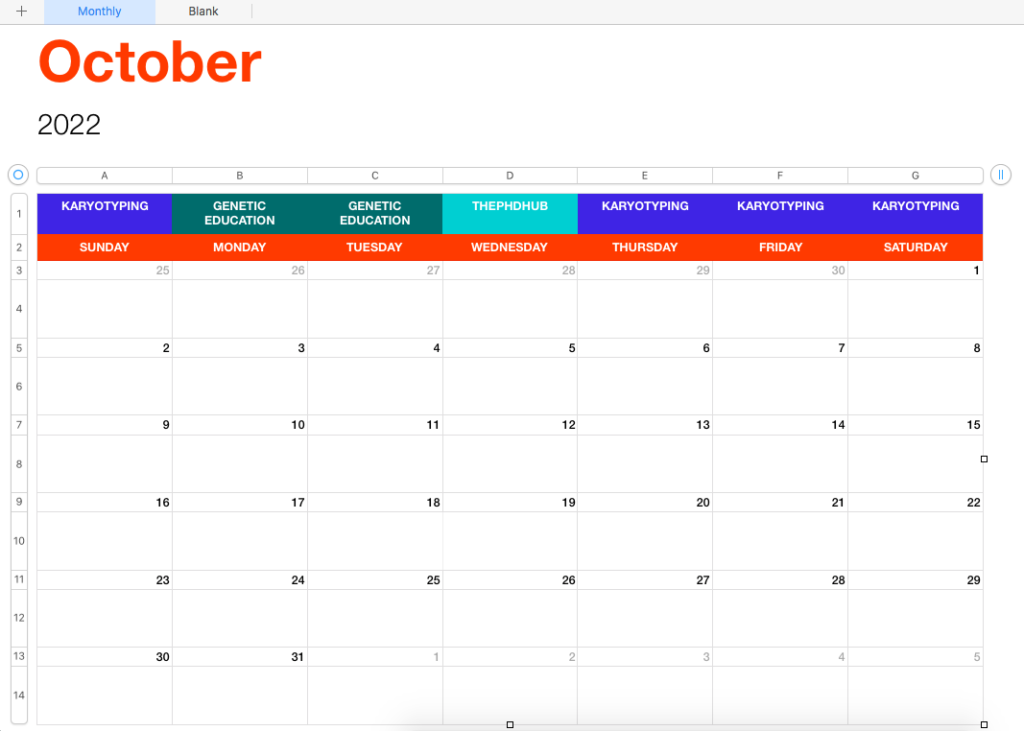
Here is the secret formula using which you can increase productivity and do more work in less time. Parkinson’s law says that work expands to the time allowed for it.
For example, if you give 5 hours to write an article, or paper or anything, you can write in 5 hours. You see your social media, and videos, and do other stuff and reach the goal. But if you give 2 hours for the same work, you can really achieve it in 2 hours.
Trust me, this is scientifically proven. Make a small goal and try to complete it in a shorter time period, put your mobile and all other activities aside and only focus on that particular piece of work.
Try it. You will love it. Remember it’s Parkinson’s law.
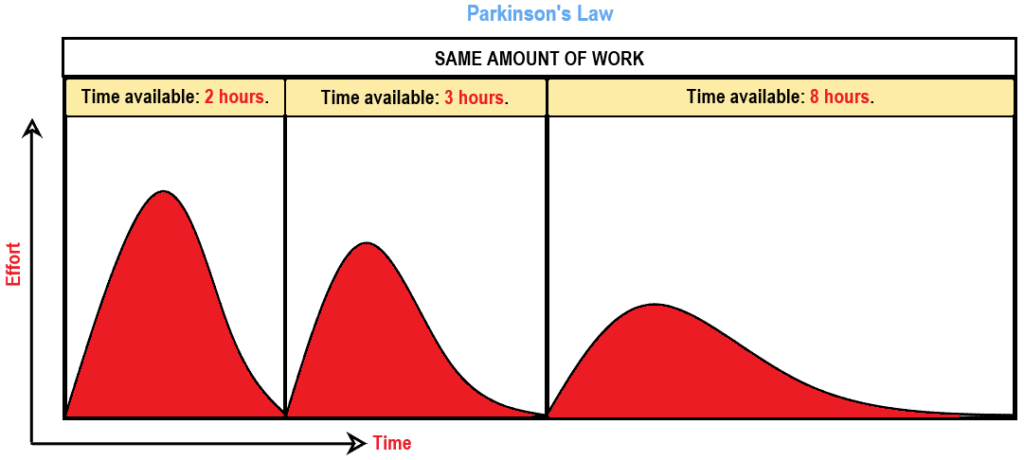
Students work only under pressure or when required. But let me tell you that you can gradually decrease your workload by managing your work from day one. Plan how much time you will give to read, write and research.
I know, at first, it looks unrealistic but it can be managed. Prepare a timetable, for example, 2 hours to search literature early before your college hours. Search sources, material or literature which possibly helps your that day’s research work.
- 2 hours- literature review
- College hours (3 to 4)- research and lab work
- 1 hour- enlist the results
- 2- read literature to correlate or justify your findings.
This should be your plan for a typical academic day. For example, let’s say today you would prepare some chemical solutions for your research. So before 2 hours of your work, read what chemicals are used, and what are their roles, quantity and variation that other scientists use.
After preparing solutions, check them, note results and search what others have found. Correlate it, and find problems so that you can work seamlessly for actual experiments.
This is something less recognized but so important. Wake up early, be prepared and enlist goals for the day. What would you do in the lab? Do remember Parkinson’s law and list more goals than the time allotted.
This routine will certainly help you to manage work and decrease your workload. In the long run, I bet you, you will be way ahead of your colleagues.
Now you have goals, planned how to execute them and worked. Go home and take a quick look at the goal book, and whether all goals are achieved, if you have achieved goals in time, before time or if some are left.
Also, note if some crucial goals are achieved in time or not.
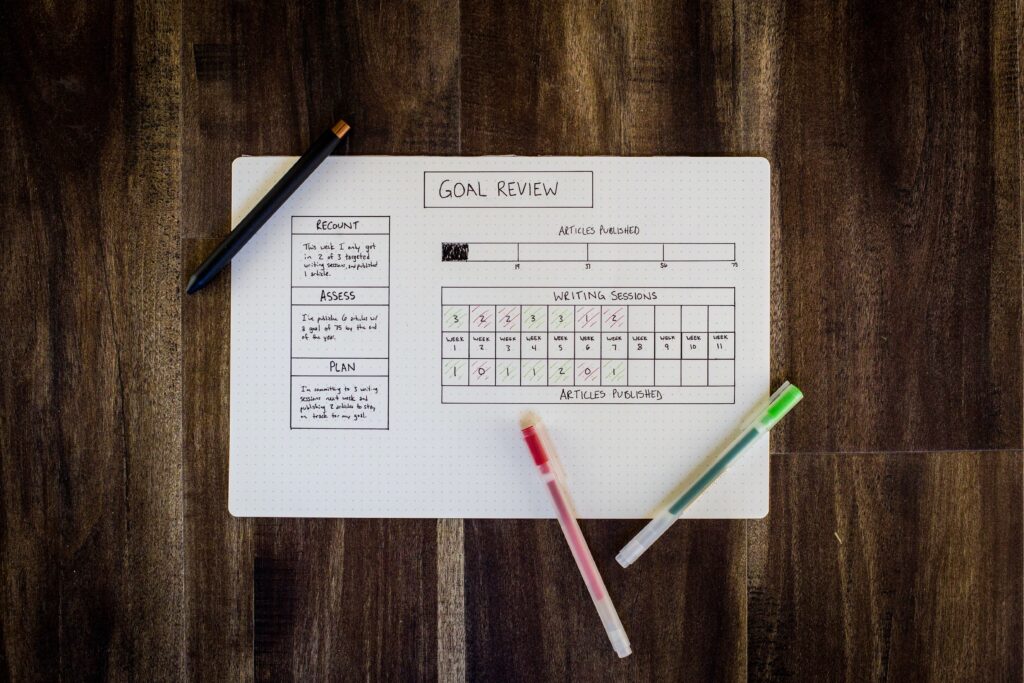
Learn a single new thing every day
See, your ultimate goal is not only achieving a PhD degree, but afterward, you also have to go for a job or something else. Your degree is not the only thing required in the future. So try to learn at least a single new thing every day.
For example, a single or two new phrases, an English word or a new language. Learn MS Office or Excel, Some tools, etc.
Do yoga and meditation
Now, this is an obvious routine not only for a PhD student but also for others. Do yoga and meditation, possibly early in the morning. Yoga will strengthen your soul and inner spirit while meditation helps you to keep calm and fight depression and stress.
Again one obvious routine for everyone. If you like or not, do exercise, cardio, and physical activity and strengthen yourself. See, to achieve some serious things like a PhD, one must have been physical and mentally strong.
Do hit the gym or exercise every single day at least for 5 days a week.
Before going to sleep, take a quick look at all of your day’s activity, and if required, take a backup of some data or work. Don’t take backup lightly, data is everything. If you lose it, you will regret it.
When to write?
Writing is a serious business. You have to give so much time and can’t be managed in a daily routine. You have to read, understand, think and then write so it takes time. Plan to do research for 3 days and write for 3 days, on a weekly basis.
Again, manage things by yourself, if you are at the early stage, you can give more time to research. If your work is almost done, you can give yourself more days to write.
It’s not military training, first of all, keep in mind. This is just a time management plan. You don’t have to always follow this. Manage things by yourself. Remember, your ultimate goal is to achieve a PhD, managing your health, mental status, physical status and social commitments.
However, self-discipline is tough but important. So try to follow this routine at least for 6 months, regularly, if you wish or if you do not wish. Once it is in process, it becomes routine.
Our students always remain ahead of their friends and we train them to follow the routine. I hope this will help you. Be a part of our community, and subscribe to us.

Dr. Tushar Chauhan is a Scientist, Blogger and Scientific-writer. He has completed PhD in Genetics. Dr. Chauhan is a PhD coach and tutor.
Share this:

- Share on Facebook
- Share on Twitter
- Share on Pinterest
- Share on Linkedin
- Share via Email
About The Author

Dr Tushar Chauhan
Related posts.
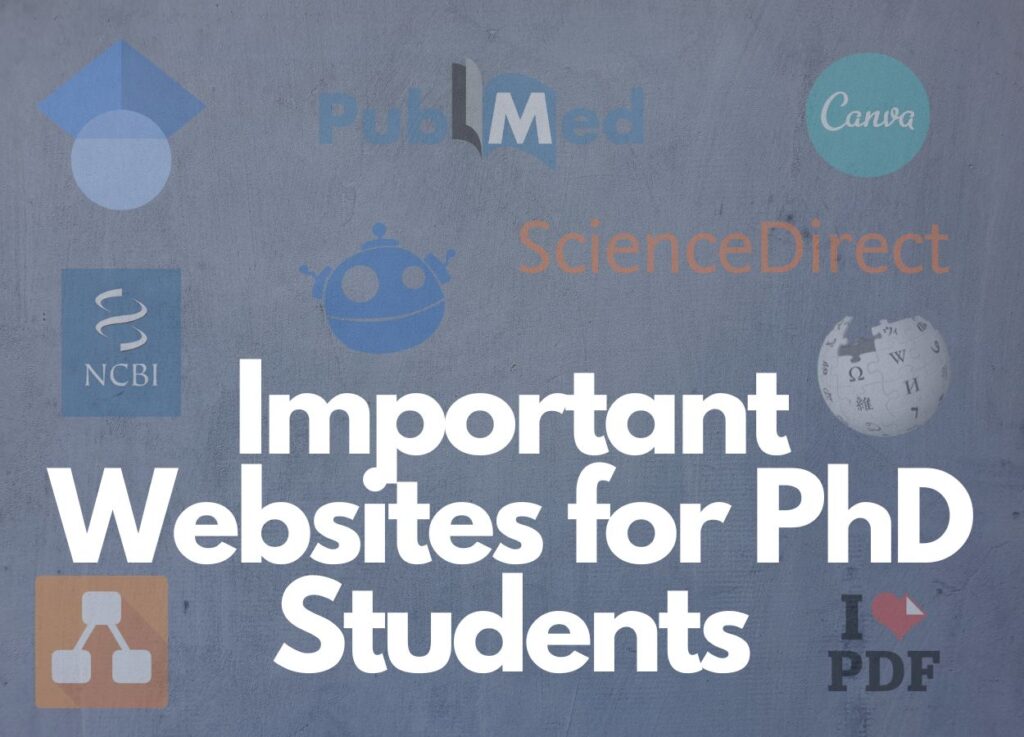
20 Amazing Websites and/or Resources For PhD Students
Leave a comment cancel reply.
Your email address will not be published. Required fields are marked *
Save my name, email, and website in this browser for the next time I comment.
Notify me of follow-up comments by email.
Notify me of new posts by email.

IMAGES
VIDEO
COMMENTS
25 things every first year PhD student should do. To turn the more abstract discussion on expectations and responsibilities into more concrete advice, the following list includes 25 things (divided into five categories) that every first-year PhD student should do.
If you are planning to apply for a PhD program, you're probably getting advice from dozens of students, professors, administrators your parents and the Internet. Sometimes it's hard to know which advice to focus on and what will make the biggest difference in the long-run.
Doing a PhD should be fun and rewarding, because you can spend all your working time discovering things and pursuing ideas — and getting paid for it, without any administrative...
Starting a PhD can be tough. Looking back, there are many things I wish I’d known at the beginning. Here, I have curated a list of advice from current PhD students and postdoctoral...
Advice for New Ph.D. Students. David F. Labaree offers recommendations based on years of experience as a doctoral adviser, associate dean of students and teacher of courses aimed at first-year doctoral students. By David F. Labaree. rudi_suardi/E+/getty images.
A Daily Routine for PhD students: The 7+8= 6 formula; Your daily planner; Parkinson’s law ; Balance reading, writing and research ; Prepare goals for a day; Check the goals for the day ; Learn a single new thing every day ; Do exercise; Check your computational work, and make a backup; An ideal daily routine for a PhD student; Wrapping up: